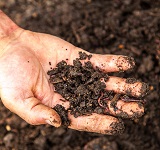Learn to Vermi-Compost June 23 at Black Creek Community Farm
Posted: June 22, 2016
Categories: GoodFoodBites / News from Sustain Members
Folks from FoodShare Toronto know all about Red Wigglers and other crawly critters that can turn your food scraps into rich garden soil. Join them June 23 from 6:30 – 8:30 pm at Black Creek Community Farm for a two-hour Vermi-Composting Workshop that promises to make you an expert too!
- Learn all about the earthworm life cycle and how to feed your worms with kitchen scraps
- Practice building your own Vermi-Compost Farm
- Get tips for troubleshooting potential problems
Participants receive a take-home Vermi-Composting Guide.
$15 Registration is required and open now online. The link will take you to everdale.org to process registration. There are limited reduced rate registrations available. E-mail Blackcreek to inquire.
Vermi-Composting is ideal for Ontario’s cold climate and for a variety of residential environments because it can be done indoors. In a relatively small container, worms can consume a large quantity of household kitchen scraps. Here are a few interesting worm facts from Cathy’s Crawly Composters to start you on your way to vermiculture expertise:
- Worms can eat up to their weight in food each day.
- Worms have five hearts.
- Worms breathe through their skin.
- The worms we use in our worm compost bins are called red wigglers.
- Worms eat all kinds of things including apple cores, rice, newspaper, watermelon rind, egg shells, bread crust, banana peels, coffee grounds and teabags.
- Red wiggler worms do not eat meat, bones, glass, plastic bags, tin cans or running shoes.
This workshop is just one of the many events taking place at Black Creek Community Farm. See their calendar for more opportunities to get growing this summer. Up next on Saturday, June 25 – Forest Food Planting Day
Toronto and Region Conservation Authority partnered with BCCF through its Sustainable Neighbourhood Retrofit Action Plan (SNAP) to addresses food security, health, and job skills training through innovative urban agriculture initiatives in an area designated as a food desert. In her report, Black Creek SNAP: Growing Food and Green Opportunities, Cathrin Winkelmann of TRCA explains that Black Creek SNAP has piloted a number of novel urban agriculture programs with support from the Local Food Fund and other grants.

